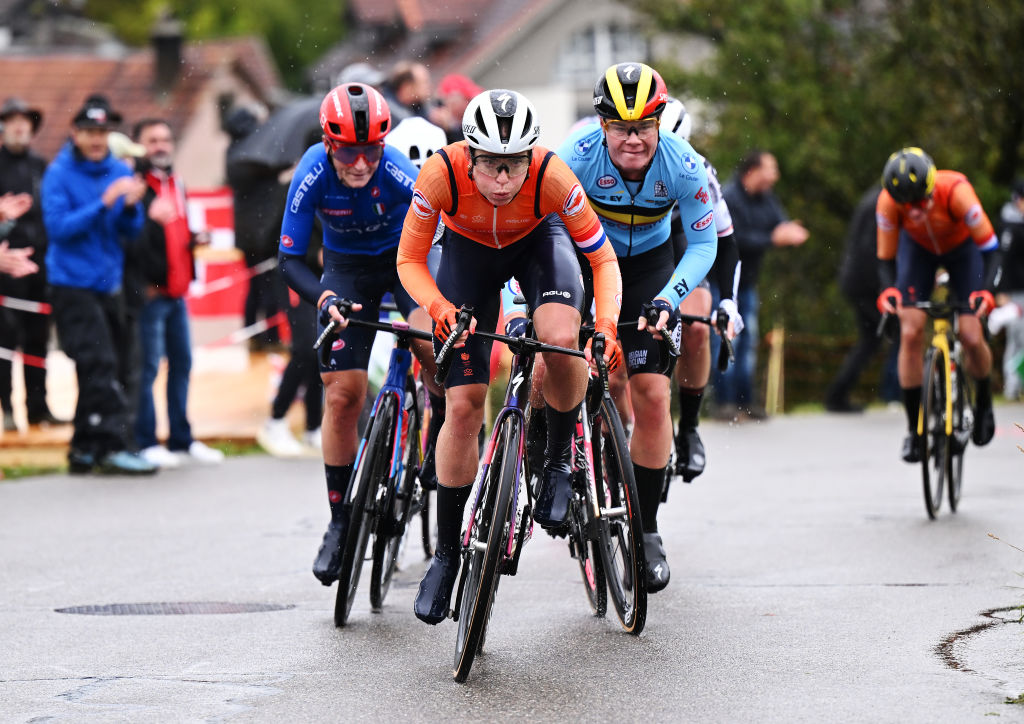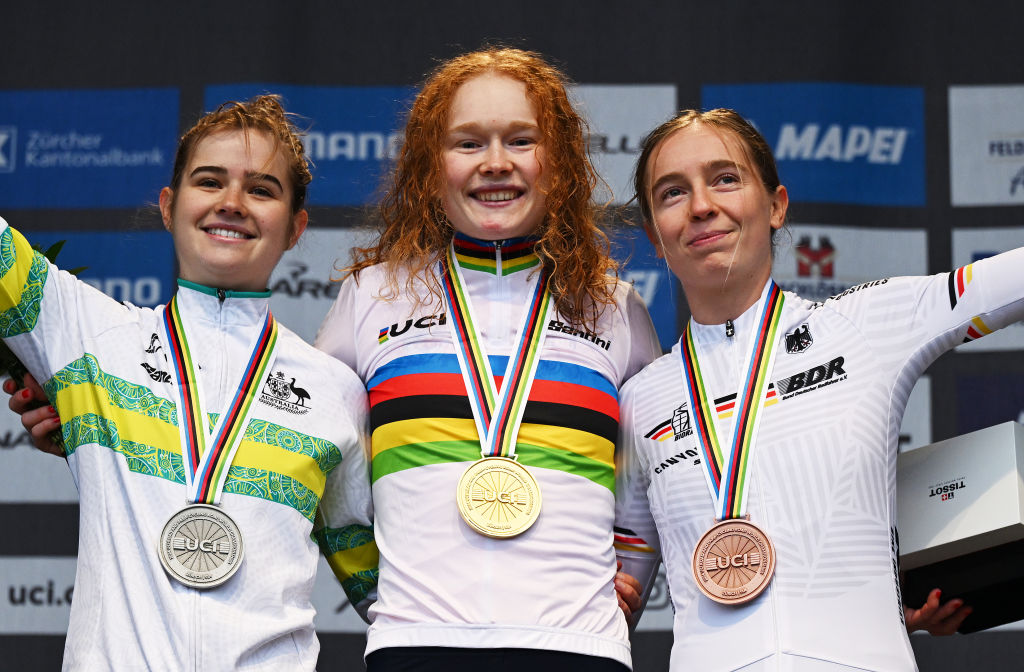Demi Vollering, debatable tactics fall short as Netherlands miss World Championship podium for first time in 10 years
Favourite comes home in fifth as Lotte Kopecky defends rainbow jersey

It would be generous to suggest the Dutch team failed to add up to the sum of its parts in the elite women's road race at the UCI Road World Championships. The women in orange somehow contrived to squander what looked like a winning hand on the final lap as the title fell once more to Lotte Kopecky (Belgium).
Pre-race favourite Demi Vollering was the best Dutch finisher in fifth, but her strategy was difficult to fathom at times. The 27-year-old is arguably the peloton's outstanding talent, but the rainbow jersey continues to elude her after a disjointed display from the Netherlands.
"It is a bit difficult to analyse now. It is so cold, and I do not really know what to think and feel at the moment," Vollering said when she arrived in the mixed zone, her teeth chattering from the cold. "One thing is for sure: we fought all day. In the end, the finale was not difficult enough to really get away."
The combination of a demanding course and miserable conditions made for an attritional race on Saturday afternoon. By the penultimate lap, the orange jerseys were in the ascendancy in the reduced peloton, though a show of force from Vollering on the climb of the Witikon with 46km to go briefly served to put teammates like Marianne Vos, Mischa Bredewold and Riejanne Markus out the back.
By the time they came around to take the bell, however, the Dutch squad had still stumbled upon something like the ideal situation. Vos and Markus found themselves with Justine Ghekiere (Belgium) and Ruby Roseman-Gannon (Australia) in a four-woman group at the head of the race, armed with a lead of a minute over Vollering, Kopecky and the rest of the favourites.
The onus at that point was surely on riders like Elisa Longo Borghini (Italy) and Chloé Dygert (USA) to lead the chase, but instead, Vollering could be seen occasionally upping the tempo on the final ascent of the Witkon, an effort that ultimately served only to doom the four-rider move with Vos and Markus.
Further Vollering forcing on the run-in, meanwhile, contributed to her team's fastest finisher Vos being jettisoned out the back. When Longo Borghini later attacked over the top of the final climb, it was Vollering who stitched the winning break back together, while Kopecky enjoyed something of a free ride to the world title.
The latest race content, interviews, features, reviews and expert buying guides, direct to your inbox!
"You can always say, 'If only we had done it this way or that way.' But it's always hard to say," Vollering said. "Maybe I should have started attacking earlier. Of course, I have to shoot my own arrows somewhere and I may have done that too late. But it is always easy to say something after the race."
Vos
When Markus rolled into the mixed zone, she explained that the Netherlands had engineered something of a dream scenario at the beginning of the final lap when she found herself off the front with Vos, while Vollering could police the favourites behind.
"I think we were in a super good situation with me and Marianne in the breakaway and of course with Demi behind," a shivering Markus said. "We just tried to make it over the climb so we would be there in the last group with three riders, but I think we were just short. That's disappointing because I think if we had three riders in the final, it would have been a different game. Demi was alone and it was just a little bit too hard."
Markus downplayed the idea that it had been an error for Vollering to accelerate behind her teammates on the final lap. "It was always the plan for her to attack on the climb. I think for her the race needs to be as hard as possible, so I don't think it's a mistake," Markus said. "But the ideal situation was that we would also make it, so it was just shit that we were not there."
Vos, meanwhile, acknowledged that she had begun to flag in the final 50km of the race, despite finding herself out in front. "The candle slowly went out, yes," she said. Like Vollering and Markus, she was reluctant to place too much blame on the team's tactical approach in the immediate aftermath of the race.
"On the last lap we knew that it could quickly fall apart," Vos said. "The idea was to make the race tough and hard so that Demi would get into a good position."
Vollering, however, seemed to suggest that the presence of her teammates out in front had restricted her freedom to throw herself onto the offensive on the final lap of the Worlds.
"It was unfavourable for me that we had Marianne and Riejanne in front on that last climb," Vollering said. "In my group, it wasn't going fast enough and there was no one who made an attack. That was disadvantageous for me. You end up in a situation where you can't do much."
'Mess'

Vollering could only manage fifth in the six-woman sprint for the rainbow jersey, while Vos and Markus rolled home a minute back. The only Dutch rider with a day to celebrate was Puck Pieterse, whose 13th place finish was enough to secure her the Under-23 world title.
"I had to go directly to the podium, so I don't know what everybody is talking about," Pieterse said when asked about the prevailing mood among her more experienced teammates after the race.
The view from outside the Dutch camp, meanwhile, was more critical, even if the silver medallist Dygert found a neat, diplomatic formula to express her take on their tactics here.
"I think sometimes the Dutch can work very well together, and I think sometimes they don't," Dygert said carefully. "I think their biggest strengths are also their biggest weaknesses. I think everybody on that team wants to win and that sometimes causes everybody to lose."
Kopecky could only smile when she was asked about the Dutch strategy in her press conference, having already faced a similar question from the broadcasters in the mixed zone. "I'm now really wondering how it looked from television because I don't know how many questions I've been asked about this," she said.
The Belgian media, on the other hand, could afford to offer a more stinging assessment. It wasn't hard to detect a touch of schadenfreude in one headline on Het Nieuwsblad's website on Saturday evening: "The mess of the Netherlands can take an example from the team play of Belgium."
In the Netherlands, you would imagine, the debate is only beginning.

Barry Ryan was Head of Features at Cyclingnews. He has covered professional cycling since 2010, reporting from the Tour de France, Giro d’Italia and events from Argentina to Japan. His writing has appeared in The Independent, Procycling and Cycling Plus. He is the author of The Ascent: Sean Kelly, Stephen Roche and the Rise of Irish Cycling’s Golden Generation, published by Gill Books.